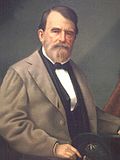This article needs additional citations for verification .(November 2025) |
November 4, 1872 | ||||||||||||||||||||
| ||||||||||||||||||||
 Election results by parish Kellogg: 50–60% 60–70% 70–80% 80–90% 90–100% McEnery: 50–60% 60–70% 70–80% 80–90% 90–100% | ||||||||||||||||||||
| ||||||||||||||||||||
| Elections in Louisiana |
|---|
 |
The 1872 Louisiana gubernatorial election was held on November 4, 1872. This was the second election to take place under the Louisiana Constitution of 1868, which established universal manhood suffrage in Louisiana as required by the Reconstruction Acts. The campaign was marred by terrorist and paramilitary action in support of the Democratic Party. Democratic candidate John McEnery disputed the official results, which declared William Pitt Kellogg the winner, but Kellogg's claim was supported by President of the United States Ulysses S. Grant. The Democratic Party sought the overthrow of the Kellogg administration, culminating in the Battle of Liberty Place in 1874, where the White League forced Kellogg from office until he was reinstated by federal troops.
Contents
This was the last time a Republican won the governorship in Louisiana until 1979.

